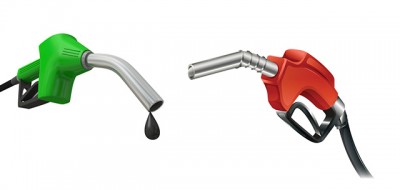Gas vs. diesel, when it comes to comparing engine choices in an automobile or light truck, is fairly straight forward. However, the same can’t be said about such a difference when we are discussing today’s class “A” motorhomes. The engine type and fuel are only a small part of the differences. They are totally two separate animals, each with their advantages.
The first thing that comes to mind is that the diesel would be far more fuel efficient than a gas model. That is not necessarily true. A 40-foot diesel pusher (DP), complete with air suspension, far outweighs a 40-foot gasoline powered motor home by up to 50 percent. The heavier frame, engine, transmission, air brake system, suspension component package, diesel generator and entirely larger chassis takes additional energy to move. Add to that, in most states and provinces, diesel fuel is priced higher than gasoline.
Diesel pushers generally ride far better than comparable gas powered rigs on the average roads in North America. They also shine when it comes to mountain travel because of their higher engine torque and engine auxiliary braking features.
Rear-end departure angle is greater on a DP. This is due the shorter distance from the rear-most axle center to the tail end of the hitch. The rear axle on a DP must be further back to support the weight of the engine. With gas, the front axle must be further forward to carry the motor,
Gas powered Class A motorhomes are generally less expensive than the DP units, some near $100,000 or so less. The substantially higher cost of a DP is in the engine, larger transmission to handle the high torque, custom heavy-duty chassis, complete air system, DEF system, diesel generator and more. Gas-powered units are also far less costly to maintain for the average low yearly mileage owner.
Clearly, the gas vs. diesel are two different animals. But buyers’ needs differ too. So, what are some of the uses that may better support a gas rig?
- Low yearly mileage. Less than 5,000 miles per year
- Need for shorter, lighter vehicle below those available with current DP models
- Want to avoid possible license upgrades or endorsements
- Not planning on doing a lot of mountain driving
- Want for an economic motorhome that better fits the budget. Can buy new gas possibly for less than used DP
Here are possibly some uses that may support buying a diesel pusher.
- High mileage yearly use—15,000 or more per year
- Want for the largest motorhome models
- Travelling often in mountainous regions
- Possibility of better fuel mileage on some smaller models
Regardless, both gas and diesel have their top-of-the-line models that, once parked, are comparable in luxury and appointments. So really there is no wrong choice, only some advantages of each, depending on one’s intended application.
It is your choice. You will be happy with either.







Anonymous
I know this is an old thread….I thought I’d answer Patricia’s questions on the MB Diesel’s since we have owned one for many years now.
Ours is a 2009 Fleetwood Icon 24A with an ’08 Sprinter chassis. It’s powerful enough but the newer version would’ve been better since it’s 20hp more powerful. We are able to do 50mph climbing some of the very steep, long, mountain passes in Colorado and it rev’s very high to achieve that. Fuel mileage is excellent though. I have to convert l/100km to mpg but we average around 15 mpg. Noise is subjective and there are different aspects to the noise. Engine noise is O.K., wind noise can be quite high when driving into the wind since we have the overhang and noise that transmits through the tires to the chassis from the highway is way too high in this chassis. The worst are those perpendicular cracks in highways, but, virtually any bump/hump/road imperfection translates big time. I wish there was something we could do to mitigate that substantially.
Brenda
What about the life of a diesel engine vs. gas? While diesel repairs may be costlier, our diesel friends claim that diesel engines have a much longer life. From what we have experienced with our 99 diesel pusher, that seems to be true — few issues with our engine/transmission. Most repairs have been related to the “home” rather than the “motor.”
Patricia Pray
New to this…question…what about the small “sprinter” Mercedes Benz diesel class C motor homes with their engine in the front? Typically they are 24 ft long, and are very light compared to the large class A DP. What has been your experience with these sprinter models? Mileage? Power? Noise?
Thanks for any insight you can share…we are trying to decide…gas or diesel in a small coach.
James Sutherland
I think another pro in the Diesel column is lower engine noise. Being 40ft in front of the Diesel pusher engine makes things a lot quieter in the cab then having the Gas engine right under your feet. Plus the high revving v10 engines common in gas motorhomes tend to be very loud when climbing hills, while Diesel’s tend to be quieter under the same load.